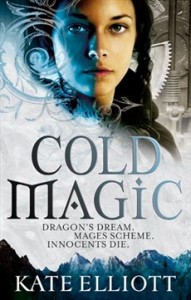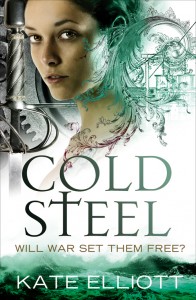Kate Elliott on the Spiritwalker Trilogy
 For the Spiritwalker project I wanted to write a multicultural world in which a mixing of cultures and people was the expected, the norm. I happen to think that when cultural change is considered across time, mixing is the norm. It is going on all the time throughout history. Interaction and influence are what keep cultures dynamic. A closed, static culture is a dying culture. In addition, these processes are not one-way. Cultural change happens in many directions, some of them exploitative and coerced and others subtle, subversive, and unexpected.
For the Spiritwalker project I wanted to write a multicultural world in which a mixing of cultures and people was the expected, the norm. I happen to think that when cultural change is considered across time, mixing is the norm. It is going on all the time throughout history. Interaction and influence are what keep cultures dynamic. A closed, static culture is a dying culture. In addition, these processes are not one-way. Cultural change happens in many directions, some of them exploitative and coerced and others subtle, subversive, and unexpected.
Certainly living in Hawaii since 2002 has influenced my choices in this regard. My earlier Crossroads Trilogy is influenced by although not specifically based on the Asia-Pacific cultural mix of Hawaii. COLD MAGIC (US | UK | AUS) and the other Spiritwalker books do not use any specific local-to-Hawaii cultural influences; however, they do incorporate ways in which I perceive that local culture has found to keep the cultural integrity of varying cultural groups (not always easily, and certainly the Native Hawaiian culture has fought a tremendous battle against colonization and erasure) allowing a unique syncretic local culture to arise that incorporates elements from all the different ethnic and cultural groups that co-exist here.
 In Spiritwalker the cultural mixing is a bit different but the process is similar: an immigrant Malian culture meets and mingles with northwestern Celtic Europe while old imperial Rome and merchant Phoenicia retain a strong influence, just to name the four most prominent cultural groups in the book (the second novel, COLD FIRE (US | UK | AUS), adds the Taino culture of the Caribbean to the mix). I admit that I wanted to highlight the immense and too-often overlooked power and richness of the West African Mande traditions and civilizations, specifically the Malian Empire. Western media and narratives too often and too easily dismiss sub-Saharan Africa (as if it is all one thing) with a few words: famine, civil war, guns, blood diamonds, slavery, and so on, and in doing so miss, denigrate and outright disappear the significant history and culture that was present historically not to mention the actual life and culture and history-in-the-making that is there right now. The history and culture of Mali is not my story to tell but I did feel I had a story to write about how we TELL history. (more…)
In Spiritwalker the cultural mixing is a bit different but the process is similar: an immigrant Malian culture meets and mingles with northwestern Celtic Europe while old imperial Rome and merchant Phoenicia retain a strong influence, just to name the four most prominent cultural groups in the book (the second novel, COLD FIRE (US | UK | AUS), adds the Taino culture of the Caribbean to the mix). I admit that I wanted to highlight the immense and too-often overlooked power and richness of the West African Mande traditions and civilizations, specifically the Malian Empire. Western media and narratives too often and too easily dismiss sub-Saharan Africa (as if it is all one thing) with a few words: famine, civil war, guns, blood diamonds, slavery, and so on, and in doing so miss, denigrate and outright disappear the significant history and culture that was present historically not to mention the actual life and culture and history-in-the-making that is there right now. The history and culture of Mali is not my story to tell but I did feel I had a story to write about how we TELL history. (more…)

